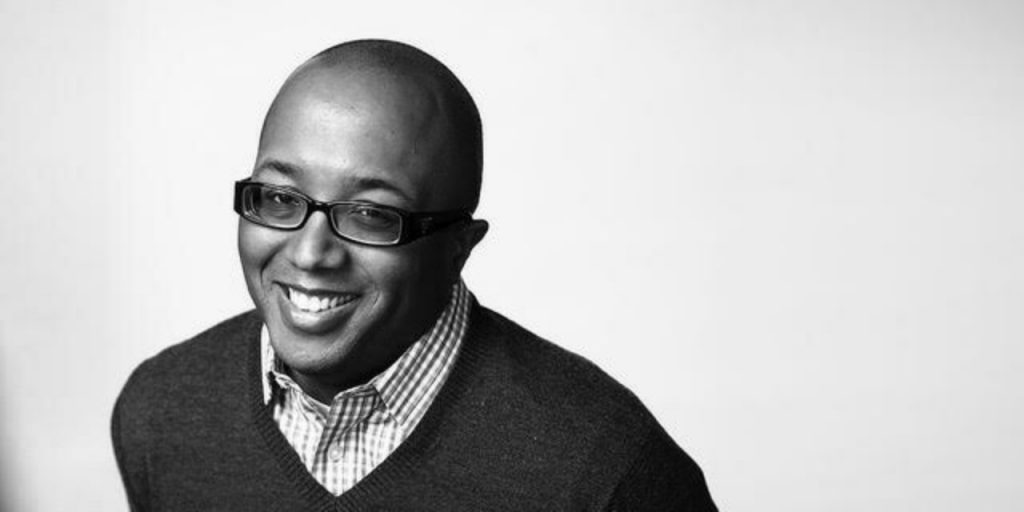Kyle Meets… Broadway director Robert O’Hara, talks ‘Slave Play’ and not comforting audiences
The year 2019 was a successful one for Broadway. With such hugely popular musicals such as Ain’t Too Proud – The Life and Times of The Temptations, Beetlejuice, and Hadestown, and such highly acclaimed plays as Burn This, Hilary and Clinton, and Ink, 2019 has created a lot of buzz in the theatre world.
However, none of the aforementioned shows have stood out from the crowd quite like young, queer playwright Jeremy O. Harris’ Slave Play – a three act play that explores themes of sex, race and power dynamics in interracial relationships. The play was staged Off-Broadway at the New York Theatre Workshop before being transferred to Broadway at the Golden Theatre on October 6, 2019.
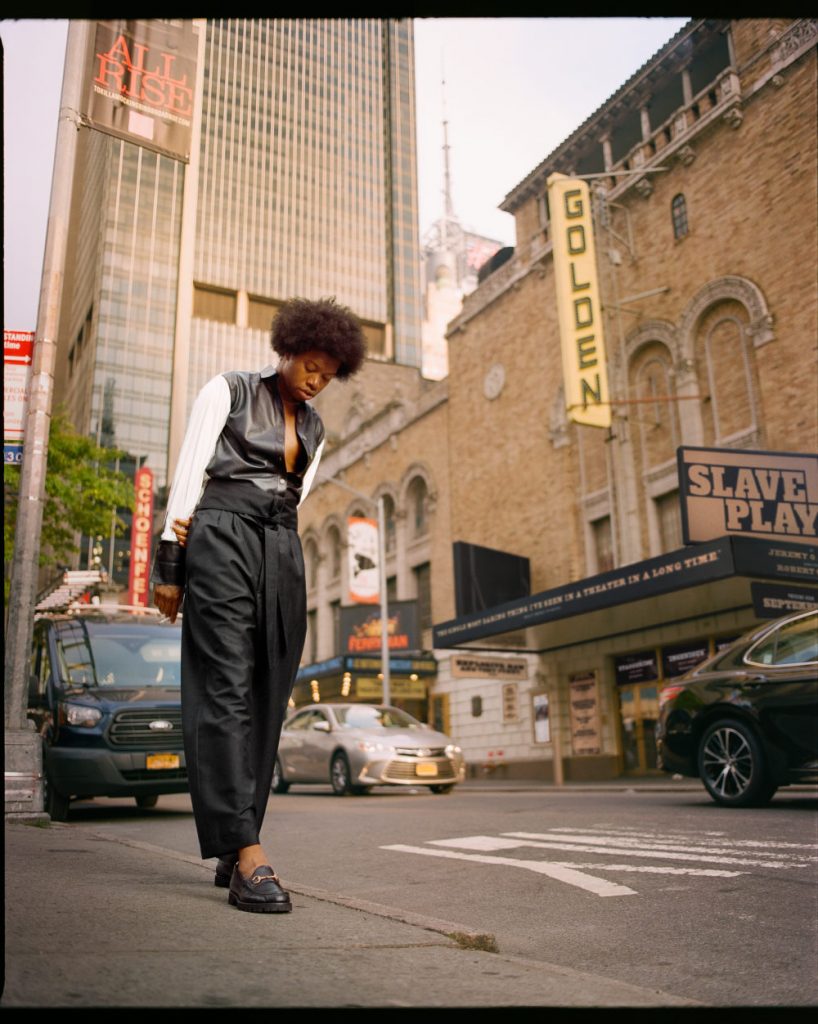
Because of its heavy subject matter, the show has polarized audiences. Many people seem to have fallen absolutely in love with it, while others have taken to social media and various other media outlets to express their disdain.
I have long followed the work of director and playwright Robert O’Hara, the director of Slave Play. I was cast in a small college production of his play Insurrection: Holding History in 2004, and then revisited it again in 2015 as a director at Annex Theatre in Baltimore, Maryland. The play is often reviewed as “bold”, “fearless” and “in-your-face”, which is also a true testament to the spirit of its writer; Robert O’ Hara does not hold back, and he is not afraid to tell it like it is.
In all the years that Robert and I have been in touch, I never really had a chance to sit down and chat with him one on one. Recently, we had a chance to sit down and discuss more of his work, the success of Slave Play, and some of the controversy surrounding it.
KJ: Hi Robert! How is everything going with Slave Play? You all are going until the end of next month, correct?
RO: Hello! Well, they are going until January 19th, but you know my job has been done since opening.
KJ: Right. Well, I’ve followed your work for many many years as a playwright – and you’re a great playwright, as well. Insurrection: Holding History is one of my favorite plays ever. When you came to see it at Delgado College – I wasn’t even going to Delgado. I was a student at Dillard University at the time – but there was a call for auditions for that particular show at Delgado. It was the first time I read the script, and I have to say it has been one of favorites ever since. It definitely had an impact on me, and I just want you to know that.
RO: Well, thank you!
KJ: First, I just wanted to talk a little bit about your work as a director, since I have followed you mostly as a playwright. I believe you went to Columbia University for playwriting, but you also directed the first production of Insurrection. Can you name a few of the other plays you have directed? Is Slave Play your first Broadway show? How did that come about?
Well, my major at Columbia was actually directing. So I’ve always been a director, just as I’ve always been a writer. I just didn’t go to writing school. However, I did write Insurrection in graduate school, but that was against the rules.
Being a director, I was supposed to find a play and direct it. They didn’t like the idea of directors writing their own plays because most directors can’t write. And there were a lot of directors putting things together, and they were saying, ‘No, you should concentrate on directing for your thesis.’
But, in any case, I’ve always been a director professionally. Actually, Insurrection was my first professional directing. I directed it as my thesis in graduate school, and then I directed it outside of graduate school at the Public Theater.
I directed the world premieres of Tarrell Alvin McCraney’s Brother/Sister Plays trilogy, including The Brothers Size and Marcus, or the Secret of Sweet, In the Continuum by Nikkole Saulter and Danai Gurira, and Colman Domingo’s Wild With Happy.
So, basically for the last quarter of a century, I’ve been directing and writing. And it’s been sort of interesting because, as you know, one can direct more than one can write. They’re not going to do seven plays of yours in one city, but you can direct seven plays in a year if you want to. I don’t choose to do that, however.
The way that Slave Play came about is that Jeremy O. Harris, the writer, was a huge fan of Insurrection, and saw it when he was in college. He wrote me, apparently, and I sent him some stuff. I ended up, a couple years ago, teaching a class for playwrights at Yale, and he was in that program. So, we connected again there. He had previously been to the city and had seen a production of my play Bootycandy –
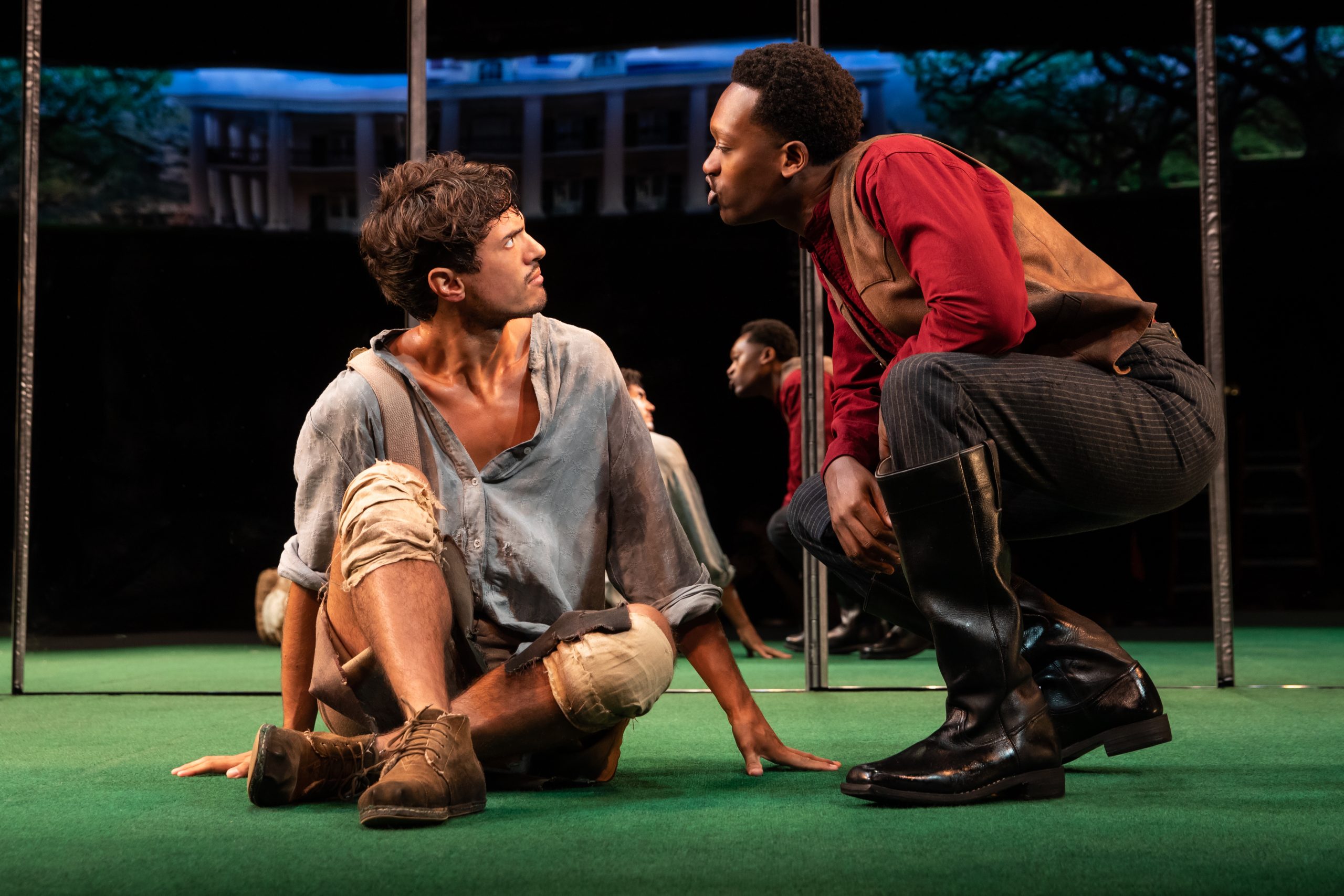
KJ: Oh, I love Bootycandy as well!
RO: Yes – well, this was before he was in graduate school, so he had been following me and had been encouraged by my work as well.
I actually had no idea that New York Theatre Workshop was staging a production of Jeremy’s play. They had just asked me if I would read the play to be considered as the director. Jeremy was considering other directors – and, as a matter of fact, I had just left Jeremy in class that day, and he hadn’t even mentioned it to me. So, I read the play, and then I spoke to Jeremy. We had a series of conversations, as he also met with other directors. And then we decided to work together.
So, it basically happened the normal way: a playwright has either seen your work, or heard about your work, or had your work recommended to them. The playwright then meets with various directors, and then they choose the one that they find to be the most interesting for the project. It just so happened that Jeremy, being a queer black man, had found himself admiring my work – namely Insurrection and Bootycandy – and so there was already a linkage there, but it just wasn’t a professional linkage.
KJ: That’s awesome! I would like to , at some point, possibly speak to Jeremy as well, because I have also had a connection to your work. It has definitely opened up a lot of creative avenues and helped send me on a path for creative discovery. Not even just creative discovery, but also self discovery.
When you came to see the production of Insurrection that I was in back in 2004, this was before I had even come out to my mother. She came to see that show. This was the beginning of me really becoming comfortable with myself and owning my sexuality, so I share that admiration and connection to your work.
I think this is great – two black queer men working together in this capacity on Broadway. Is that even a thing? Has this ever happened before?
RO: Well, I’m sure it has happened, since gay people are everywhere. The thing is that it has never really been a prominent part of the information about a show. But it’s also rare for a black play to be directed by a black director on Broadway, unless it’s something like August Wilson.
KJ: Yes, because I know August Wilson has been very direct about his preference for black directors directing his shows.
RO: Yes. Although I did see a production of an August Wilson show on Broadway with a white director, and I believe he was still alive when that show went up.
But, you know, I think there are a lot of things that are firsts that should have been seconds, thirds, and fourths. So, while I take pride in being a queer black director and directing a work by a queer black playwright, I also have to put it in context and acknowledge the history of discrimination and racism in the industry that would not allow or promote that type of working relationship.
Slave Play is a very difficult and controversial play in that it is dealing with slavery, but it’s also being performed in a very commercial space. So, we have to have a responsibility about the way we talk about it, the way we promote it, and the conversations we have around it. We can’t have the same conversations around Slave Play that Ain’t Too Proud or Tina – the Tina Turner Musical can have.
KJ: I’m glad you said that, because it brings me to my next point about some of the controversy surrounding Slave Play. I just saw the video last week where a white audience member stood up at a talk back and had a lot of things to say about the show. Now, even though the audience member was white, I’ve also seen a lot of black people saying both positive and negative things about the show.
I remember your play Insurrection: Holding History being included in the Fire This Time anthology, and the play was prefaced with a note written by you which said that you wanted the audience to “choke”.
RO: Yes.
KJ: That stood out to me tremendously. Can you talk a little bit about the controversy surrounding Slave Play? Do you feel like this play is a bit of a calling for you as director and a playwright?
RO: You know, I think that just existing in the world in a black queer body is provocative to people. Their provocation can’t be my full engagement. So, while I’m not unaware of provoking people or having controversy in my life because of who I am and how I walk through the world, I’m also not going to give as much space as one would like to have in my life.
A couple of weeks ago, that woman did stand up and talk back. But the interesting thing about it is that there are rarely talk backs on Broadway stages. You don’t normally go to a Broadway show and then afterwards there’s a talk back. And when you do see a talk back on a Broadway stage, you most certainly don’t see a black playwright and a black female lead doing a talk back.
So, to me, that in itself was unique. But then, this white woman had issues and decided to fully interrupt the proceedings – because she was not called upon to speak. She was obviously dealing with whatever she was dealing with that was connected, in whatever way, to the production. And so, that was her expression.
This is also why I don’t normally do talk backs. Because I don’t believe that just because you have an opinion that I have to hear it. My job description does not include “I have to come and listen to you tell me what you think about the show”. So, when I allow people to ask me questions, or when I respond to questions about it, that is something that is outside of my job description that I am giving as a part of my relationship to whoever I’m speaking to. It is not an obligation.
So, I think that the theatre is where conversations begin, and it’s where you ask questions. Some of the questions are difficult. You can tell from my own work that I don’t let anyone off the hook. Everybody is welcome, but nobody is safe.
KJ: Exactly. (laughs)
RO: I’m not there to provide comfort to people. If you come to a play with the word “slave” in the title looking for comfort, then you’ve come to the wrong fucking place.
I’m not giving you comfort. No one is making my life comfortable. No one’s curating my experience being a black gay man in this country, and no one’s preventing me from being triggered in the morning when I wake up and turn on the TV. So why am I expected to provide anyone else with that sense of comfort?
Where is your sense of responsibility for knowing what you’re walking into and deciding to not walk into that? This is not something being performed in the middle of the street. You paid money and walked into a building. You had every opportunity to figure out where the fuck you were going.
So, I’m not here to provide comfort for audiences, because no one’s providing comfort for me. And that’s how I feel. And sometimes you go through certain things and it’s the experience itself that you may not feel comfortable in. But your comfort may not be a part of it. Maybe it’s supposed to be uncomfortable. Maybe you should try to get comfortable with being uncomfortable, just as black people, queer people, and women have had to.
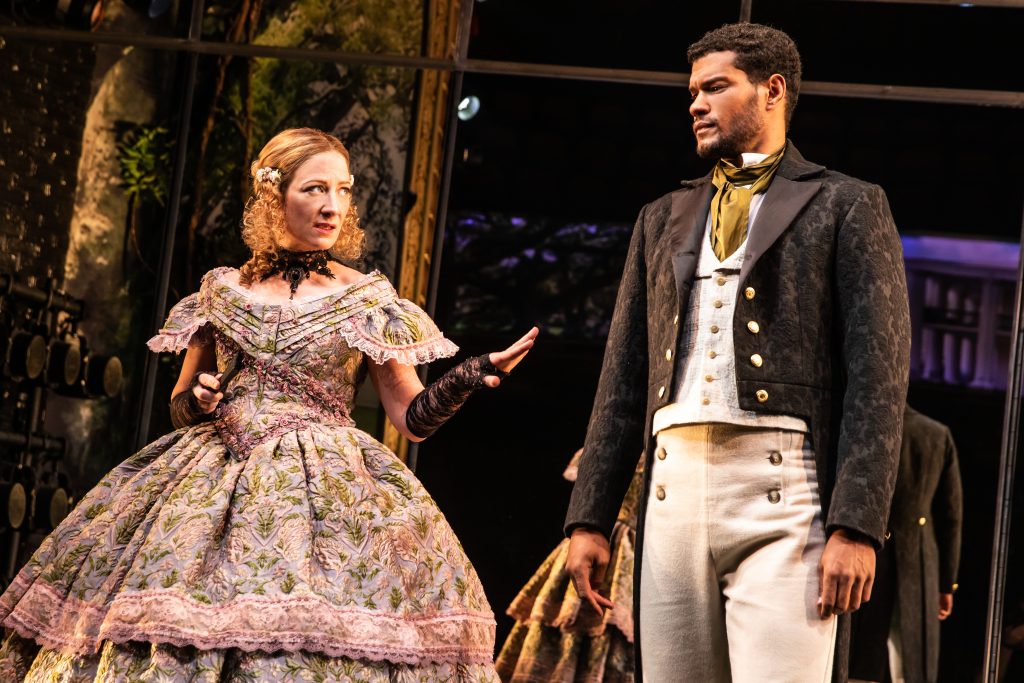
KJ: Absolutely. Sometimes you have to sit in that discomfort.
RO: Yes. And then take yourself back to your reality and deal with it there. But it’s not for you to say, “I’m upset because you made me uncomfortable.” No, you came to an uncomfortable space and was uncomfortable. (laughs)
And much of the stuff online is from people who have either not seen the show, or don’t think the show is worthy to be seen – so they’re sort of doing what social media does, which is a bunch of people talking about shit they don’t know anything about. And since I cannot and do not subscribe to people just walking out and saying whatever stuff they want to say to anyone that’s around, I have to keep myself away from that.
I don’t go seeking that information. I’ve actually removed myself from Twitter and Instagram, even though I had never tweeted anything in my life. But there were Twitter and Instagram accounts with my name on them. You have to protect yourself. In order for me to do the work, I have to protect myself from people who would have me not do the work.
Whenever I pick up a pen or walk into a rehearsal room, there’s a bunch of people on the other end telling me what was wrong with what I did – and doing so in the public and in the press. So, I’m not going to bring more of that on myself. I have to protect myself from those people, and from others. I write it, I direct it, and other people converse over it.
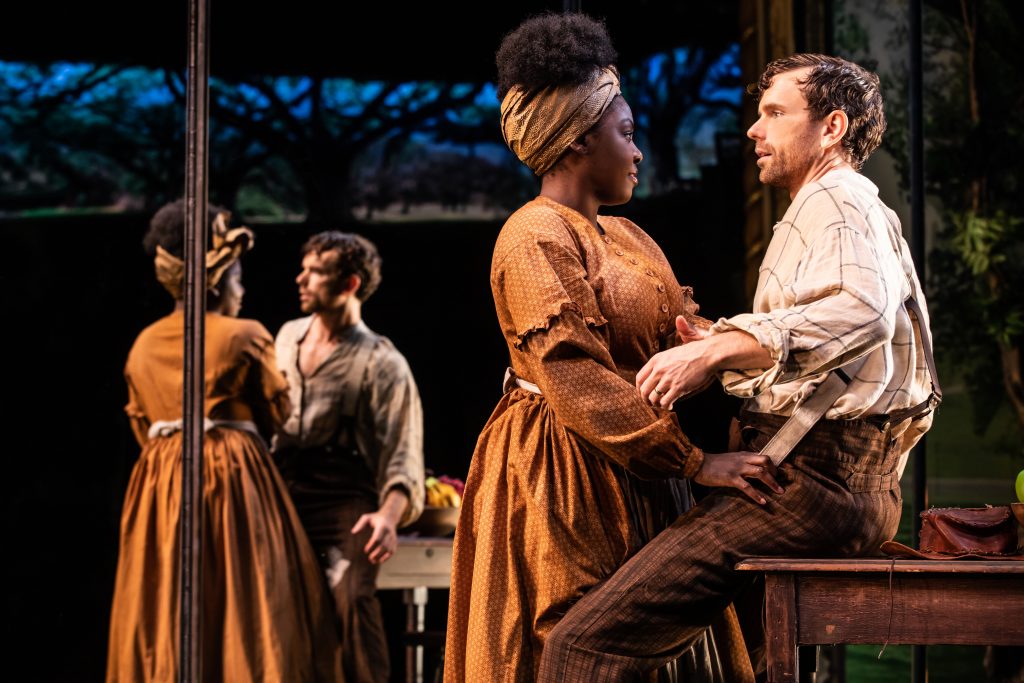
KJ: I agree with you. Watching that video of the Slave Play talk back brought me back to the production of Insurrection: Holding History that I directed in Baltimore. During the scene where the characters Hammet and Ron kiss, there was an older black woman – she had to be about 70 – in the audience who very audibly let out a “Gross!” in the middle of the show at the sight of the two male actors kissing.
Afterwards there was a talk back, and she had a lot to say about how being gay was not historically a part of the black experience and it was some type of perversion created by white people – or something of that nature. I definitely had to shut that down. I did it respectfully, because she was old enough to be my grandmother, but I presented numerous examples to explain to her why that wasn’t true at all.
RO: I’ve had several people tell me about those certain experiences when people who are homophobic, racist or sexist walk into the wrong room and think that they can rule the room, and think that the room is supposed to be for their engagement. Unfortunately, we tend to give up a lot of space to those people, and we let them go on and on and on. And that’s one of the things that I don’t like about talk backs.
A talk back, to me, is a gift to the audience. Many think that a talk back is an obligation. As an audience member, you’re supposed to be asking a question. But you ain’t asked a question yet. You’ve been talking for thirteen goddamn minutes. So, I’m like – Are you going to ask a question, or not? You just want to give me your opinion, but I ain’t asked for your opinion. People came to see my show, they didn’t come to hear your homophobia or racism after my show.
KJ: Well, that’s that. That’s how you feel about that. (laughs) I must confess and say that I have not been to see Slave Play yet. I’ve been so busy, but I’ve heard amazing things. I definitely will be booking my tickets to see it before it closes on January 19th.
RO: Good! Definitely come to see it. You know, I always think that it’s better for people to see something and then open their mouths about it than to just let someone tell you that you shouldn’t see it. They’ve been saying that to black people for a long time – that certain things were not for us. So for other black people to tell black people that they shouldn’t see something, it’s sort of silly and ridiculous to me.
It’s also true that the show’s not built for everyone to like it. It’s triggering. It has the word “slave” in it. So, some people ain’t ready for it, and ain’t ready to see it. Just like there’s a lot of shit that I don’t need to see, and there’s also a lot of shit that I have already seen that wish I hadn’t. But the fact of the matter is that these are artists, and they have the right to put up whatever they want to put up. It’s called Freedom of Speech.
So I encourage people who want to see it to see it, and people who don’t want to see it to find something else.
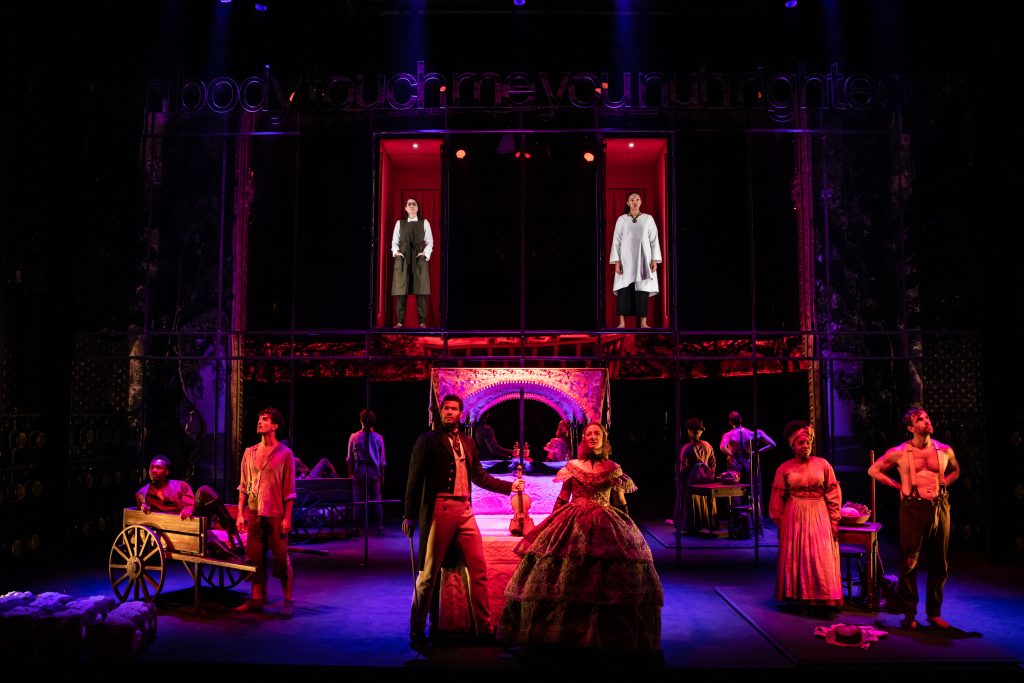
KJ: So finally, aside from Slave Play, which is the hot thing going on right now, what else do you have in store. Do you have anything else coming up? Do you plan to get into any TV or film or anything like that?
RO: Well, the very next project that I’m doing is a musical that I’ll be doing down in DC – that they’re hoping to bring into New York City at some point – called Gun and Powder. And it’s about these two very light skinned black women who are sharecroppers, and they figure out a way to become outlaws, pretending to be white women – because the societies tend to let white women into spaces they don’t let other people into – and robbing people. They take advantage of their skin color and use it to become criminals. It’s sort of a “Bonny and Clyde” story set in the old west.
There’s also some projects I can’t talk about. They’re still secret and have not been announced. But I am working in television on a couple of things. I’ve done one film, and it was pretty scary because I had never done a film. We had no money to do it, which is how first films usually are. So, all I see are the mistakes. Hopefully the next time I do a film, we’ll have more money (chuckles) – and I’ll have more of a background in doing it. Since I’ve now done one film, I feel like I’m now ready to do another one.
So, there’s a lot of stuff happening, and a lot of stuff in the works. But I take it one day at a time, and I try to do less and less. Because you also have to live your life and be fulfilled outside of the work. Usually when people talk to me the moment I’m done with a show, they will come up to me and ask, ‘What’s next?’ And I’m like… Umm, can I have a break? Is that possible? (laughs)
But yes, there’s always stuff coming up.

